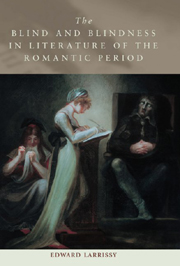Book contents
- Frontmatter
- Contents
- Preface
- Acknowledgements
- 1 The Enigma of the Blind
- 2 The Celtic Bard in Ireland and Britain: Blindness and Second Sight
- 3 Blake: Removing the Curse by Printing for the Blind
- 4 Edifying Tales
- 5 Wordsworth's Transitions
- 6 Coleridge, Keats and a Full Perception
- 7 Byron and Shelley: The Blindness of Reason
- 8 Mary Shelley: Blind Fathers and the Magnetic Globe: Frankenstein with Valperga and The Last Man
- 9 Conclusion
- Bibliography
- Index
4 - Edifying Tales
Published online by Cambridge University Press: 12 September 2012
- Frontmatter
- Contents
- Preface
- Acknowledgements
- 1 The Enigma of the Blind
- 2 The Celtic Bard in Ireland and Britain: Blindness and Second Sight
- 3 Blake: Removing the Curse by Printing for the Blind
- 4 Edifying Tales
- 5 Wordsworth's Transitions
- 6 Coleridge, Keats and a Full Perception
- 7 Byron and Shelley: The Blindness of Reason
- 8 Mary Shelley: Blind Fathers and the Magnetic Globe: Frankenstein with Valperga and The Last Man
- 9 Conclusion
- Bibliography
- Index
Summary
The condition of the blind may furnish good matter for a story. There are many possibilities: their capacity to act as competently as the sighted, or learn to do so; their retention of a good heart when struck blind, or possession of one despite being blind from birth; the tricks that the sighted may play upon them, or the compassion they may demonstrate or elicit. All of these fundamental narrative opportunities may become involved with contemporary reflections on the value of work, the existence or otherwise of innate benevolence, or the way in which spiritual insight may be attained. A straightforward example is provided by a very popular and oft-repeated tale of blind competence and industry. The chapbook, The Life of John Metcalf, appeared in the late eighteenth century and was reprinted many times. Metcalf, commonly known as ‘Blind Jack of Knaresborough’, was a renowned figure. He also makes an appearance in the anonymous Anecdotes of the Deaf, Dumb, and Blind (1800?), alongside various figures, some obscure; some, like Carolan and Blacklock, less so. As we have seen, he is mentioned by Scott in a footnote to ‘Wandering Willie's Tale’. He had been blinded by smallpox when six years old, but, as the title of the book makes clear, he engaged competently in many exploits of ‘Hunting, Card Playing, &c.’, as well as building roads and erecting bridges. Not surprisingly, he proved expert at music, and entertained the ‘nobility and gentry’ with his skill.
- Type
- Chapter
- Information
- The Blind and Blindness in Literature of the Romantic Period , pp. 89 - 101Publisher: Edinburgh University PressPrint publication year: 2007



